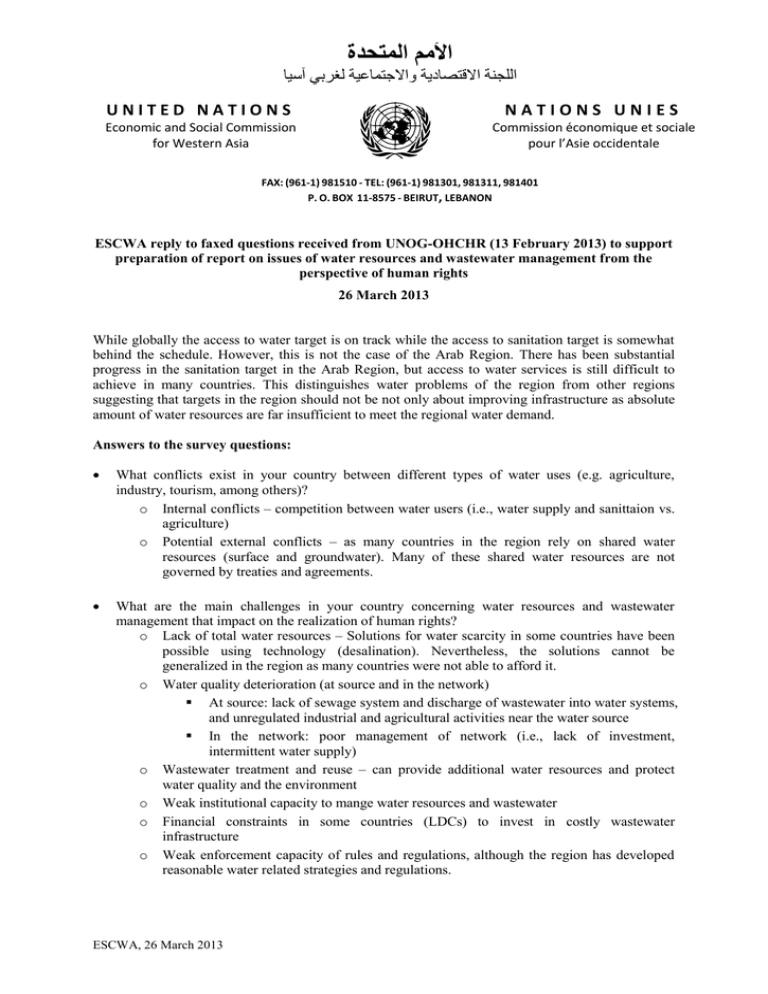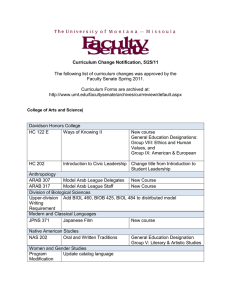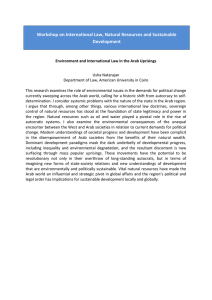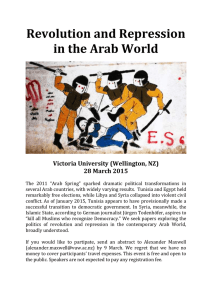ةدحتملا مملأا
advertisement

األمم المتحدة اللجنة االقتصادية واالجتماعية لغربي آسيا UNITED NATIONS NATIONS UNIES Economic and Social Commission for Western Asia Commission économique et sociale pour l’Asie occidentale FAX: (961-1) 981510 - TEL: (961-1) 981301, 981311, 981401 P. O. BOX 11-8575 - BEIRUT, LEBANON ESCWA reply to faxed questions received from UNOG-OHCHR (13 February 2013) to support preparation of report on issues of water resources and wastewater management from the perspective of human rights 26 March 2013 While globally the access to water target is on track while the access to sanitation target is somewhat behind the schedule. However, this is not the case of the Arab Region. There has been substantial progress in the sanitation target in the Arab Region, but access to water services is still difficult to achieve in many countries. This distinguishes water problems of the region from other regions suggesting that targets in the region should not be not only about improving infrastructure as absolute amount of water resources are far insufficient to meet the regional water demand. Answers to the survey questions: What conflicts exist in your country between different types of water uses (e.g. agriculture, industry, tourism, among others)? o Internal conflicts – competition between water users (i.e., water supply and sanittaion vs. agriculture) o Potential external conflicts – as many countries in the region rely on shared water resources (surface and groundwater). Many of these shared water resources are not governed by treaties and agreements. What are the main challenges in your country concerning water resources and wastewater management that impact on the realization of human rights? o Lack of total water resources – Solutions for water scarcity in some countries have been possible using technology (desalination). Nevertheless, the solutions cannot be generalized in the region as many countries were not able to afford it. o Water quality deterioration (at source and in the network) At source: lack of sewage system and discharge of wastewater into water systems, and unregulated industrial and agricultural activities near the water source In the network: poor management of network (i.e., lack of investment, intermittent water supply) o Wastewater treatment and reuse – can provide additional water resources and protect water quality and the environment o Weak institutional capacity to mange water resources and wastewater o Financial constraints in some countries (LDCs) to invest in costly wastewater infrastructure o Weak enforcement capacity of rules and regulations, although the region has developed reasonable water related strategies and regulations. ESCWA, 26 March 2013 How are different water uses prioritized in national legislation and policies? How are these priorities implemented in practice? Are there any implementation challenges? If yes, please elaborate on them and on measures taken to overcome them. o Although traditional (religious) water management systems in the region puts priority to drinking, in practice, modern legislation and policies have not fully accommodated these principles into practical and implementable measures. What strategies, approaches and mechanisms guide water resources and wastewater management? How do these ensure that the basic needs of the entire population are met? o IWRM – Since IWRM principle invites all water stakeholders to water decision making and encourage integrated management of water resources among different users, it can reduce inefficiencies in water resources management and support water access to general population. How does your organization ensure transparency, access to information and participation in decision-making regarding water resources and wastewater management? o ESCWA contributes to the following regional processes and initiatives that have been initiated by Arab Governments through the Arab Ministerial Water Council, ESCWA Ministerial Council and the ESCWA Committee on Water Resources in cooperation with international and regional partner organizations. “Establishing a regional mechanism for improved monitoring and reporting on access to water supply and sanitation services in the Arab Region” (MDG+ Initiative) “Regional initiative for the assessment of the impact of climate change on water resources and socio-economic vulnerability in the Arab Region” (RICCAR) “The Arab water security strategy in the Arab Region to face challenges and future demand for sustainable development 2010 – 2030” (translated from Arabic) ESCWA serve on the Board of Directors of the Arab Countries Water Utilities Association (ACWUA), which was established through the ESCWA-GIZ Cooperation and is now an independent association of public and private sector water supply and sanitation services providers. ESCWA-BGR Cooperation in the water sector ESCWA is supporting the League of Arab States and the Arab Ministerial Water Council with the preparation of a legal framework on shared water resources in the Arab region, which focuses on surface and groundwater resources shared between Arab countries Promotion of IWRM principles In your view, should water resources and wastewater management be reflected in the Sustainable Development Goals / post-2015 development framework? o For the Arab region, this is certainly necessary as absolute water scarcity is the fundamental cause of most water problems in many countries of the region. o Accessibility to water infrastructure should not be used as a proxy for monitoring access to water services, especially drinking water due to regional concerns regarding the provision of water in a sufficient quantity, quality or reliability; and issues related to access to water resources and services in occupied lands or areas suffering from conflict. o Water is cross cutting that has direct effects on socio-economic and environmental sectors like education, health, agriculture, tourism, mining, manufacturing, gender, etc. o Link between water availability and climate change o Link between public health and sanitation and human dignity ESCWA, 26 March 2013


